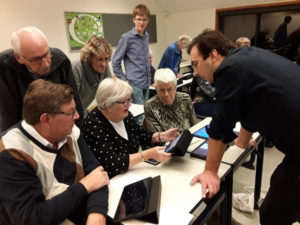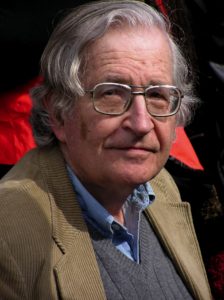Groningen kweekvijver van zorgvernieuwing ~ Aanzetten tot vermaatschappelijking van de zorg
De ouderenzorg in Groningen komt steeds meer onder druk te staan door de vergrijzing en bevolkingskrimp op het platteland. Maar Groningers zijn inventief in het bedenken van oplossingen. Met innovaties die de zorg verbreden, welzijn bevorderen en technologische vernieuwingen introduceren. Zappend langs innovaties die de zorg veel meer dan nu integreren in het dagelijks leven van ouderen.
Het is nog maar zeer de vraag of de ouderenzorg in Groningen de komende decennia nog wel toegankelijk en bereikbaar is. Met die waarschuwing luidde Zorgverzekeraars Nederland (ZN) in het voorjaar van 2017 de noodklok. Ook de landelijke overheid, het provinciebestuur van Groningen en diverse gemeenten lieten weten dat er hoog nodig iets moet gebeuren. Niet alleen vanwege de demografische veranderingen, want er is in deze provincie meer aan de hand dan alleen krimp en vergrijzing. Het rumoer rond de aardbevingen en hoog oplopende discussies over het dichtdraaien van de gaskraan waren een wake up call om deze keer de boel niet op zijn beloop te laten. Zeker niet in een provincie waar sociaal economische statistieken rood kleuren als het gaat om werkloosheid, inkomen, opleidingsniveau en gezondheid. Kortom, er is werk aan de winkel in Groningen.
Een zevental zorgaanbieders in deze provincie reageerde slagvaardig. In een intentieverklaring bepleitten de zeven een ouderenzorg die het menselijke perspectief voortaan als maatstaf neemt. En zich minder aantrekt van knellende wet en regelgeving die een goede zorg in de weg staat. Ze stelden dat de overheid veel meer rekening moet houden met verschillen tussen afzonderlijke regio´s en de lokale omstandigheden. Een jaar later blijkt dat hun wensen helemaal in lijn zijn met de aanbevelingen in het onlangs gepubliceerde rapport De juiste zorg op de juiste plek van een Taskforce op initiatief van oud-VWS minister Van Rijn. (Zie: https://www.rijksoverheid.nl/de-juiste-zorg-op-de-juiste-plek)
De samenstellers hiervan noemen de problemen in de ouderenzorg taai en complex, met het risico dat standaardoplossingen de plank volledig mis slaan. Met andere woorden; de gewenste vernieuwingen in het zorglandschap laten zich niet van bovenaf regelen met uniforme landelijke akkoorden. De overheid kan dit proces van vernieuwing volgens de Taskforce wel faciliteren en versnellen door ruimte voor veranderingen te creëren met flexibele kaders en randvoorwaarden.
Groningen is fundamenteel anders
Het provinciale fonds Zorgvoorzieningen en regionale zorgprojecten is een voorbeeld van zo’n faciliterende overheid die een duwtje in de goede richting wil geven. Dit fonds is een jaar geleden door het provinciebestuur in het leven geroepen om, zo staat te lezen in het uitvoeringsprogramma, iets te doen aan de knellende regelgeving en te stimuleren dat de zorg meer over de grenzen van de eigen sector heen kijkt. Wat dit laatste punt betreft geeft het provinciaal bestuur zelf alvast het goede voorbeeld, want formeel heeft de provincie geen directe verantwoordelijkheid op dit beleidsterrein. Gemeenten en zorgaanbieders gaan hier primair over. Het provinciebestuur rechtvaardigt deze interventie met het argument dat de omstandigheden in de provincie Groningen fundamenteel anders zijn dan in de rest van Nederland. Met een budget van ruim drie miljoen kunnen voorzieningen in de ouderenzorg experimenteren. En maken burgerinitiatieven aanspraak op een, zij het bescheiden, subsidiebedrag zodat ze zich kunnen mengen in de wereld van zorg en welzijn voor ouderen. Tot wat voor projecten leidt dit? En wat levert het op?
Heel verschillende invalshoeken
Wellicht is een begin van het antwoord op die vragen te vinden in de lijst met projectaanvragen die gehonoreerd zijn. In mei 2018 werd bekend wie in de eerste van drie toekenningsronden een subsidiebijdrage kreeg toegewezen. Bij de projecten van zorgvoorzieningen valt vooral op hoe zeer ze onderling van invalshoek verschillen. Zo kiest een aantal zorginstellingen in het noordoosten van de provincie voor het bundelen van hun specialistische kennis in een geriatrisch Expertise Netwerk. Daardoor kunnen de aangesloten verpleeghuizen en de woon/ zorgvoorzieningen in de regio een beroep doen op multidisciplinaire teams van het expertisenetwerk. Maar opent ook de mogelijkheid voor ouderen in hun werkgebied die nog thuis wonen om gebruik te maken van deze gespecialiseerde diensten. Het tweede project dat geld krijgt van het provinciefonds, betreft de opzet van het Medisch Centrum in Hoogezand-Sappemeer. Het samenbrengen van basisziekenhuiszorg en anderhalvelijnszorg onder één dak, opent deuren naar meer samenwerking met het sociaal domein, aldus een toelichting van de provincie. Het derde zorgproject gaat over de bouw van een multifunctionele accommodatie midden in de natuur. Een zorgorganisatie voor verstandelijk gehandicapten wil dit nieuwe gebouw samen met Staatsbosbeheer en een Theetuin in gebruik nemen. De accommodatie alsmede het natuurgebied er om heen, wordt een plek waar gehandicapten kunnen leren en werken. Maar moet ook aantrekkelijke ontmoetingsplek worden voor mensen van buiten de zorg die er kunnen recreëren.
Ouderenvriendelijk dorpshuis
Naast deze drie varianten van zorgverbreding zijn er vooral aanvragen gehonoreerd op het terrein van leefbaarheid en welzijn. Preciezer geformuleerd is het geld gegaan naar aanvragen van dorpshuizen die hun accommodatie aantrekkelijker en toegankelijker willen maken voor ouderen en zorgbehoevenden in het dorp. Zo zijn er dorpen met een lege sportzaal of een voormalige school die ze willen verbouwen tot dorpshuis dat ook geschikt is voor kwetsbare ouderen. En worden twee ander dorpshuizen om dezelfde reden gemoderniseerd. Er zijn twee dorpshuizen die als multifunctionele accommodaties onderdak willen bieden aan zorg gerelateerde voorzieningen. Dan gaat het om een huisartsenpraktijk, een apotheek, dagbesteding of een project voor burenhulp door vrijwilligers. Al deze toewijzingen beogen een betere toegankelijkheid van dorpshuizen voor ouderen. En lijkt er sprake van een herwaardering van het dorpshuis, als ontmoetingsplek en als laagdrempelige voorziening voor een groeiend aantal ouderen.
Een generatie pioniers
Het provinciefonds heeft ook een budget beschikbaar voor lokale initiatieven van bewoners. In het uitvoeringsprogramma staat het voorbeeld van Dörpszörg Ulrum; een initiatiefgroep van dorpsbewoners die informele zorg organiseert voor hun kwetsbare dorpsgenoten en zich heeft ingezet voor een ontmoetingsplek. Opmerkelijk genoeg ontbreken soortgelijke burgerinitiatieven op de lijst met toegekende aanvragen. Terwijl Groningen zich rijk mag rekenen met een generatie pioniers op dit gebied. In dorpen als Warffum, Kloosterburen, Ulrum, Loppersum en Meeden kwamen een jaar of vijf geleden tot de verbeelding sprekende zorginitiatieven van bewoners van de grond die Groningen destijds ook landelijk op de kaart hebben gezet. Zo is de Zorgcoöperatie Loppersum vijf jaar na de oprichting uitgegroeid tot de grootste vereniging in het dorp. En Warffum liep vier jaar geleden voorop met het project GoudOud. Naar aanleiding van de sluiting van het plaatselijke verzorgingshuis zag het er naar uit dat de meest kwetsbare groep ouderen verplicht werd te verhuizen. Om er voor te zorgen dat deze ouderen in hun dorp konden blijven wonen, hebben ze in Warffum een mooi plan voor de oudste inwoners opgesteld, waarin het wonen, de zorg en het welzijn op de schaal van het dorp met elkaar verweven is. Groningen telt momenteel, rijp en groen door elkaar, zo´n vijftig tot tachtig lokale zorginitiatieven. En behoort daarmee, net als Gelderland, Brabant en Limburg, tot de plattelandsprovincies met veel dorpen die de informele zorg voor ouderen gezamenlijk regelen.
# https://www.goudoudinwarffum.nl/
Zorgzame gemeenschappen
In Groningen beginnen deze lokale zorgprojecten zich inmiddels regionaal en provinciaal te organiseren. Zo hielden vijf dorpen in de kop van de provincie in het najaar van 2017 een bijeenkomst in het dorpscafé van Hornhuizen. En wisselden ze ideeën uit over een gedroomde toekomst van het wonen, de zorg en het welzijn in hun dorp voor jong en oud. In februari dit jaar werd in de kerk van Garmerwolde een netwerk Zorgzame dorpen Groningen gelanceerd, bedoeld om provinciaal de krachten te bundelen en ideeën uit te wisselen. Inmiddels steken burgerinitiatieven voor zorg ook de kop op in stedelijke gebieden. En is er sinds 2015 een breed landelijke netwerk actief onder de naam Nederland Zorgt Voor Elkaar. ‘Dit maakt de inhoud en de kwaliteit van de zorg sterker’, liet minister Hugo de Jonge donderdag 17 mei in Stadion Galgenwaard in Utrecht nog weten. Tijdens een bijeenkomst van het landelijk netwerk over Zorgzame gemeenschappen vertelde de minister dat hij eigenaarschap als een belangrijke meerwaarde ziet van al deze burgerinitiatieven in de zorg. En noemde het een waardevolle ontwikkeling dat steeds meer mensen zich persoonlijk betrokken voelen bij de zorg in hun buurt. En stak de aanwezigen een hart onder de riem met de toezegging dat hij dit onder de aandacht zal brengen bij gemeenten, die namens de overheid als eerste verantwoordelijk is voor dit beleidsterrein.
Klik hier voor Overzicht burgerinitiatieven in de zorg.
Ketenstages
Na innovatieve zorgvoorzieningen en lokale burgerinitiatieven, is het onderwijs de derde partij die druk aan de weg timmert. Mooi en heel praktisch voorbeeld hiervan is de ‘Ketenstage’, deze nieuwe stagevorm is door de Academie voor verpleegkunde ontwikkeld, samen met vier grote zorgorganisaties in de regio. In een ketenstage lopen studenten iedere zes weken stage bij een andere zorginstelling. Dit kan variëren van thuiszorg en verpleeghuis tot revalidatie en ziekenhuis. Ze volgen de zorgprocessen in afzonderlijke zorgvoorzieningen en zien hoe de overdracht daartussen plaatsvindt. Het Ministerie van VWS heeft dit concept als best practice opgenomen in haar Actieprogramma ‘Werken in de zorg’. Ook het middelbaar beroepsonderwijs draagt bij aan de vernieuwingen. In een viertal Zorgtechnologie huizen kijken mbo/studenten samen met zorg- en welzijnsinstellingen, gemeenten en woningcorporaties naar nieuwe toepassingen van domotica en zorgtechnologie. En de studenten geven voorlichting aan ouderen en hun mantelzorgers over de mogelijkheden om met inzet van technische apparatuur en hulpmiddelen langer veilig en gezond thuis te wonen. Ze laten de bezoekers kennismaken met de nieuwste technische snufjes op dit gebied.
Centraal telezorgcentrum
Deze introductie in de zorg bij techniekstudenten is een nuttige investering voor de toekomst, want technische vernieuwingen worden steeds belangrijker om logistieke problemen in de zorg op te lossen. Bij uitstek Groningen, een provincie die vergrijst en een dunbevolkt platteland heeft, kan hier nog veel baat bij vinden als personeelstekorten de zorg verder onder druk zetten. Een mooi voorbeeld van zo´n technische oplossing voor deze regio is het project Virtuele Thuiszorg in de gemeente Eemsmond. Sinds een jaar maken vijfhonderd zorgbehoevende ouderen daar kennis met nieuwe vormen van telezorg, verstrekt door een regionale zorgorganisatie. Via tablets, slimme horloges, mantelzorg apps en sensoren kunnen cliënten op elk gewenst moment contact opnemen, digitale informatie delen en overleggen met een centraal telezorgcentrum. Dit nieuwe concept van zorg op afstand, als aanvulling op de beschikbare personele zorg, is een ongekende weelde in een dunbevolkt gebied als Eemsmond. Het project, met Vodafone/Ziggo als een van de ontwikkelpartners, werd dit voorjaar in vakkringen onderscheiden met de Computable Award 2017 in de categorie Digital Innovation van het jaar.
Innovatiewerkplaatsen
Een opvallende speler uit het Hoger onderwijs is het Centre of Expertise Healthy Ageing of Healthy Aging Network Northern Netherlands (CoE HA of HANNN) Dit netwerk is onder aanvoering van de Hanzehogeschool en met subsidie van het ministerie van OCW vijf jaar geleden tot stand gekomen om innovaties in gang te zetten op het gebied van gezond opgroeien en gezond ouder worden. Dit netwerk heeft zich ten doel gesteld dat de noordelijke provincies één grote Blue Zone worden. Dat is met een knipoog naar de vijf blue zones in de wereld; bijzondere gebieden waar mensen tot op hoge leeftijd kerngezond blijven en uitzonderlijk oud worden door een combinatie van levensstijl en gunstige omstandigheden. Iets om je aan op te trekken als provincie waar de bevolking minder gezond is en een lagere levensverwachting heeft. Bovendien klinkt het perspectief van een blue zone zo veel beter dan termen als vergrijzing en ouderenzorg.
Walking football
Om de lat niet al te hoog te leggen, introduceert HANNN ‘blue spots’, plekken waar ze het ideaal van een blue zone alvast een stapje dichter bij brengen. De motor van de organisatie zijn de Innovatiewerkplaatsen, daarin worden onderzoekers, docenten, studenten, bedrijven en zorg- en welzijnsinstellingen bijeen gebracht om zich gezamenlijk te buigen over maatschappelijke thema´s als gezondheid, opgroeien, onderwijs en ouderdom. Zoals gezondheidspleinen, of een walking football festival, om mannen en vrouwen boven de zestig aan het voetballen te krijgen. Of met complexe innovaties, zoals de implementatie van persoonsgerichte zorg en toepassingen van wearables en e/health technieken. HANN ziet zich als spin in dit web dat potentiële partners verbindt, nieuwe ontwikkelingen aanjaagt en beloftevolle praktijken verspreidt.
Zorg voor een nieuwe generatie ouderen
Tot zover deze rondgang langs een waaier aan vernieuwende projecten. De projecten die langskomen vormen weliswaar een ongesorteerde verzameling. En ze zullen naar alle waarschijnlijkheid de wicket problems van de ouderenzorg niet oplossen. Maar ze bieden wel een blik op de trapveldjes waar ruimte is voor improvisatie en spelplezier. En dan zien we zorgvoorzieningen die hun deuren open stelen voor nieuwe partners, binnen en buiten hun domein. Dorpshuizen die toegankelijker willen worden voor een nieuwe generatie ouderen die zich aandient, burgers die zich vrijwillig inzetten voor zorgbehoevend ouderen in hun buurt. Studenten die tijdens hun stages leren om over de muren van afzonderlijke zorgvoorzieningen heen te kijken. Middelbaar en Hoger onderwijs die in de praktijk op zoek gaat naar oplossingen voor actuele kwestie als vergrijzing, langer thuis wonen en gezond ouder worden. En daarvoor netwerken organiseren waar partners met heel uiteenlopende achtergronden elkaar vinden op deze thema’s.
De kwaliteit van het leven
De vergrijzing dient zich, met name op het platteland, steeds nadrukkelijker aan: in de winkels, bij de huisarts en op straat. Dit is geen doemscenario; we worden niet alleen steeds ouder maar blijven ook veel langer gezond. De bejaarden van vroeger zijn nu actieve senioren, het overgrote deel woont zelfstandig thuis. Om tot op hoge leeftijd deel uit te maken van het gewone dagelijkse leven, ook als ze zorgbehoevend worden. Daar zijn ook steeds meer mogelijkheden voor. Ouderenzorg is niet langer het exclusieve domein van zorginstellingen, zorgmanagers en professionals. Ook burgers, bedrijven, scholen en maatschappelijke organisaties dragen daar een steentje bij. De zorg voor ouderen is, om het maar even samen te vatten, aan het vermaatschappelijken. Wat nog meer opvalt is de veranderende visie op vergrijzing en de associatie van ouderen met ziekte, verval en afhankelijkheid. Bij de projecten in dit artikel gaat het vooral over het bevorderen van gezondheid, welzijn en zelfredzaamheid, en meer in het algemeen over de kwaliteit van het leven. Het is de halfvolle fles die als leidraad geldt en, om de relativerende variant daarop uit het geheime dagboek van Hendrik Groen aan te halen: Pogingen iets van het leven te maken.
.




